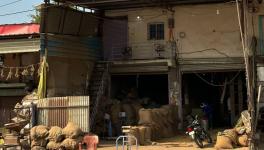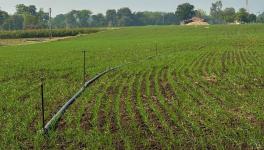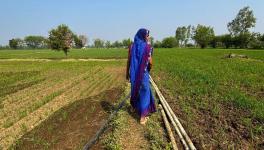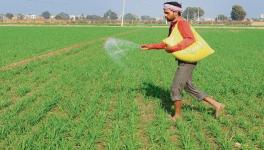Housewives, College Girls Line up in Rewari to buy DAP Fertiliser
Image Courtesy: Tribune India
Manisha is among the several undergraduate students in Rewari district, Haryana, who skip their classes and queue up at diammonium phosphate (DAP) sale counters amid the acute shortage of the fertiliser.
The acute shortage of DAP, caused by the surging global prices, in Haryana has forced housewives and college girls of agricultural households in Rewari and Gurugram to line up at sale counters in the district to buy the fertiliser.
DAP and urea are the key fertilisers required for wheat, the biggest Rabi crop in Haryana and Punjab. Wheat is grown in more than 35 lakh hectares in Punjab and 25 lakh hectares in Haryana, which are the biggest contributors to the country’s food grain buffer stock.
Since Manisha’s father cannot stand in queue for a long time due to his old age, she lined up at a DAP sale counter. “But there is no system to distribute DAP here, leading to chaos,” she told The Tribune. Several other students who skipped classes as well to buy DAP have had to return empty-handed.
According to Savita, a housewife from Khol village, the counters sell only two bags of DAP per Aadhaar card though the requirement is much more Women leave household chores and line up at sale centres, she told The Tribune.
About 110 kg of urea, 50 kg of DAP and 20 kg of MOP (muriate of potash) are required for every acre of wheat. The landed price of imported DAP in India is $675-680 per tonne (cost plus freight) as against $370 at the same time last year. MOP, which was imported at $230 per tonne a year ago, is now available for not less than $500.
“I came to the sale counter early in the morning but have not yet got the fertiliser. It is affecting my studies badly,” said Naveen, another student, adding that elderly farmers have no other option but to rope in their family members to get DAP for mustard and wheat crops.
Manju had to queue up at a DAP sale counter to help her husband, who could not get the fertiliser due to the heavy rush, caused by the lack of a proper distribution system—though Balwant Singh, deputy director (agriculture) claimed that there is a system to ensure that every farmer gets DAP.
In Nuh district, children are skipping school to buy the fertiliser. The situation has turned worse with several farmer families sleeping in front of the sale counters at night to get early-morning tokens. Only five farmers are allowed to buy DAP at one time and it takes an average of four-to-five hours to get a bag of the fertiliser, The Tribune reported.
Strangely, state agriculture and farmers welfare JP Dalal claimed on Thursday that there is sufficient stock of DAP in the state and the long queues of farmers have been fuelled by rumours.
“Whenever there are rumours of shortage, farmers start seeking fertiliser for sowing the next cycle of crops too. Those involved in black-marketing also try to take advantage of the situation. We have reports of huge black-marketing of the fertiliser in neighbouring Punjab and Rajasthan. To keep a check on the smuggling of the fertiliser to these states, we give it to our farmers only after checking documents such as Aadhaar or land documents. This too has led to queues of farmers in front of the offices of cooperative societies,” Dalal told The Indian Express.
Claiming that there was a demand for one lakh tonne (20 lakh bags) DAP in October last year, Dalal said, “Initially, we had 53,000 tonnes of the fertiliser in October this year. Later, 52,000 tonnes more arrived in the state, taking the total to 1.05 lakh tonnes. Another 9,000 tonnes of the fertiliser will arrive in the next two days. We have also sought additional 16 containers (48,000 tonnes) of DAP for the current month.”
On October 12, the Centre had approved an increase in the subsidy on DAP from Rs 24,231 to Rs 33,000 per tonne
to make it viable for fertiliser firms to import and also stop them from raising the maximum retail price too sharply given the upcoming Assembly elections in Punjab and Uttar Pradesh.
Get the latest reports & analysis with people's perspective on Protests, movements & deep analytical videos, discussions of the current affairs in your Telegram app. Subscribe to NewsClick's Telegram channel & get Real-Time updates on stories, as they get published on our website.
























